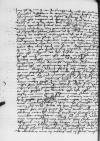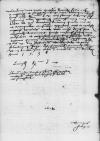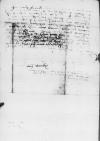List #2006
Felix REICH do Ioannes DANTISCUSFrauenburg (Frombork), 1538-12-02
| odebrano [1538]-12-04 Rękopiśmienne podstawy źródłowe:
Publikacje:
| ||||||||||||||
Tekst + aparat krytyczny + komentarzZwykły tekstTekst + komentarzTekst + aparat krytyczny
Reverendissimo in Christo Patri et Domino, domino
Reverendissime in Christo Pater et Domine, domine clementissime.
Post officiosissimam devotionis meae commendationem.
Immortales ago gratias Reverendissimae Dominationi Vestrae, quod tam paternam de mea valetudine sollicitudinem gerat. Rependat Dominus, omnis benevolentiae retributor, eam beneficentiam et animi propensionem.
Quod ad venerabilem dominum
In causa domini
Processus autem ille, salva pace domini
Iam quod Reverendissima Dominatio Vestra de surrogando mihi per coadiutoriam successore domino Fabiano de Voynaw scribit, profecto non adversarer voluntati et legitimo desiderio Reverendissimae Dominationis Vestrae, si res esset integra ob egregii viri illius virtutes, eruditionem et {et} in ea aetate tam insignem ac raram multarum rerum experientiam. Quibus huic ecclesiae esset imprimis utilis, verum iamdudum cum parentibus nepotis mei, quem brevi ad suscipiendos sacros ordines ad Reverendissimam Dominationem Vestram mittere propterea decrevi, ita constitutum et firmatum est, ut id favoris consanguineo meo praedicto nunc non infeliciter Elbingi bonis litteris operam danti impendere iuxta condicta me oporteat, ne vanitatis arguar aut promissa rescindam.
Sollicitabat idem olim apud me felicis recordationis
Si modo Dominus vitam eatenus mihi prorogaverit, ut in urbe expediri negotium hoc possit, hoc veritate ipsa teste affirmare ausim me mea sponte saepenumero solicitum fuisse, si qua ratione domino Fabiano canonicatus Warmiensis obtingere possit potuisset, etiam superinscribed⌈etiametiam superinscribed⌉ ut mortuo nepote meo (ut sumus omnes mortales) Fabianum ipsum mihi successorem optaverim. Sed valde dubito, an pro quoviscumque me vivo negotium hoc confici queat. In omnem tamen eventum temptandum erit.
Quod nuntius tardius fortassis, quam conveniebat, revertitur, non ei, sed adversae valetudini meae imputetur, qui non omnibus horis scribere possum. Affligunt me plerumque harpyae meae, alioqui prope exsanguem humanarum carnium voracissimae. Phtysis et febris ethica intromittunt tamen nonnumquam rabiem, ut addubitem, num in melius vel in peius vergat  BCz, 1597, p. 329 valetudins meae ratio quotidie. Proinde feriae mihi a negotiis et scriptationibus iure debentur iamtandem. Quas mihi Reverendissimam Dominationem Vestram, cui sanus lubens semper inservirem, nunc aegrotanti concessuram non dubito, ut vel vocationem Dominicam quieta mente et tranquilla conscientia exspectare, aut a molestis negotiis vacuus, modo vitam mihi Deus prorogaret decreverit, tanto melius saluti meo consulere et corpusculum mitius fovendo redintegrare queam.
BCz, 1597, p. 329 valetudins meae ratio quotidie. Proinde feriae mihi a negotiis et scriptationibus iure debentur iamtandem. Quas mihi Reverendissimam Dominationem Vestram, cui sanus lubens semper inservirem, nunc aegrotanti concessuram non dubito, ut vel vocationem Dominicam quieta mente et tranquilla conscientia exspectare, aut a molestis negotiis vacuus, modo vitam mihi Deus prorogaret decreverit, tanto melius saluti meo consulere et corpusculum mitius fovendo redintegrare queam.
Commendo me superinscribed⌈Commendo meCommendo me superinscribed⌉ gratiae et favori Reverendissimae Dominationis Vestrae. Cui diuturnam incolumitatem et omnem felicitatem precor.
Ex
Eiusdem Reverendissimae Dominationi Vestrae devotus
Postscript:
Libenter audio causam praebendae domini



